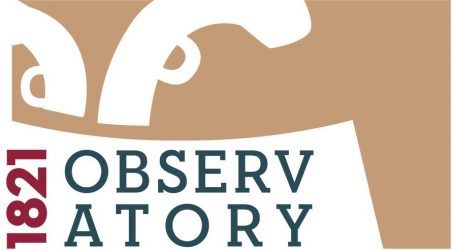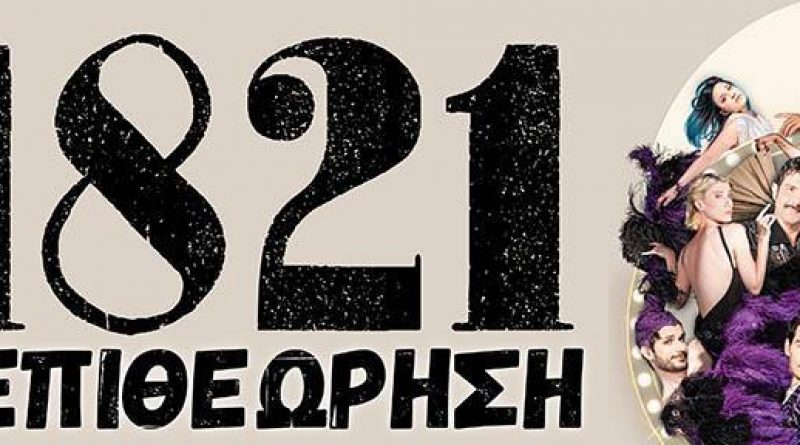Revue like Revolution
After the lifting of the Covid restrictions, the country’s theatres were enlivened by performances reflecting different artistic expressions that were inspired by the bicentenary of the Greek Revolution. Older plays, as well as some novel new performances, brought to the fore historical events, persons and concepts such as heroes, freedom and revolution, completing the artistic map of the events. What one might not have expected to see in this context was the presentation of a revue dealing with the Greek Revolution: “The1821: The Revue”.
The theatrical performance, characterised by many as the renaissance of the revue, was composed by the musician – and not only –Foivos Delivorias and the director Dimitris Karantzas. “The1821: The Revue”, a plain title so characteristic that it leaves no doubt as to the subject matter, the type but above all the style of the show. Added to a date full of symbolism that relates to one of the most important periods of recent Greek history is the word “revue”, with the clear purpose of identifying the type of the play, referring associatively to all those elements that characterise the Greek theatrical revue. And as if the above was not enough, the English definitive article “The” is added to 1821 (following the example of other international productions and works), somehow giving it the meaning of the “show”.
According to Karantzas, the inspiration for the project are the texts and radio broadcasts of Manos Hatzidakis, but also the speech of Kolokotronis onPnyx Hill which refers to the need to see the future without looking only at the past. As a part of the bicentenary celebrations, the project of the two artists deals with “national” questions: who are we, what is our homeland, what was 1821, what is our present? These almost quaint themes, which have concerned Greek society throughout time, as well as aspects of modern Greek culture and recent events,are presented on stage through short stories, which have as their subject matter social inequality, nationalism, antiquarianism, ignorance and division.
A characteristic element in most of the show’s scenes is the almost continuous entanglement of the past with the present. The actors embody mythical or real persons who jump or who exist parallel in different time zones. This elaborate juxtaposition of the old with the modern deals even with the philosophical questions “where are we?” and “where are we going?” but without taking away from the humorous style of the scenes. The impressive, almost “caricaturistic” sets and imaginative costumes guide the viewer inrecognising and understanding this complex and transitory environment without distracting from the essence of the performance.
The challenge that the creators managed to overcome was to incorporate all the good elements of the traditionalrevue into a work worthy of the bicentennary. Satire and sarcasm touch the historical events and persons with a humorous but, at the same time, critical point of view, projecting to the audience an alternative image that does not integrate or fixate their importance. The relaxed, comfortable and continuous movement of the actors on the stage from the very beginning of the performance removesany separation between audience and actors, thus creating a relationship of immediacy and communication. Through the narratives and dialogues, the characters of the play, whether great heroes of the revolution or prominent institutional figures of modern Greece, do not appear as supernatural entities butas ordinary people. However, there are also humorous stories of common “new Greeks” of the quaint modern everyday life that, in addition to laughter, provoke the public’s criticism of modern society.
There is nothing more typical in a revue than music, song and dance, which together create a cheerful and pleasant atmosphere. As expected, the musical component is the work of Foivos Delivorias. He accompanies the opening scene of the performance as a group of dancers enter the stage dressed in clothes resembling those worn in traditional performances of classical works. Delivorias created a quartet, in cabaret style as he would say, with good improvising musicians who can assimilate various types ‒which is always done in the revue‒ so that the specific play also has a musical identity. Gianna Angelopoulos-Daskalaki, first-class or forgotten TV stars, supposedly incorruptible politicians, singers from the glory days of the night clubs, multi-awarded directors, Kolokotronis and Karaiskakis as well as every day people,victims of the current affairs are some of the characters that appear in “The1821: The Revue”.
Karantzas and Delivorias succeeded in staging a revue full of music, glitter, criticism, humour and history. Having at their disposal a group of important writers and a troupe of skilled protagonists, they re-examined the Greeks’ relationship with national identity, the revolution, tradition, the exploits and mishaps of the bicentenary, and ending up celebrating, dancing, satirising and wondering. Their aim was not to deal with current affairs but to search for the core of the issues raised by the bicentenary and which gave rise to a more poetic approach that is neither accusatory or cheaply satirical. What emerged was a“crossover” revue that managed to connect 200 years of Greece on stage.
Pericles Chrysafacoglou, PhD candidate at the Department of History and Ethnology, Democritus University of Thrace
Photography: info-war.gr

